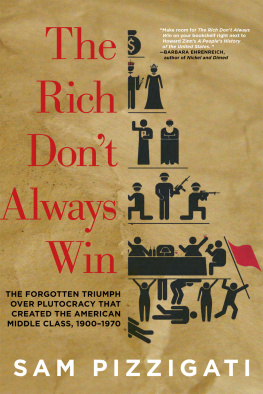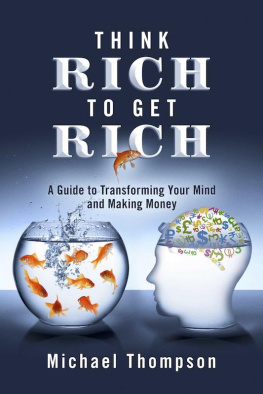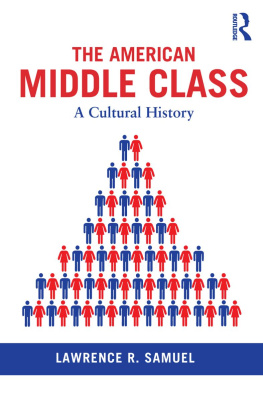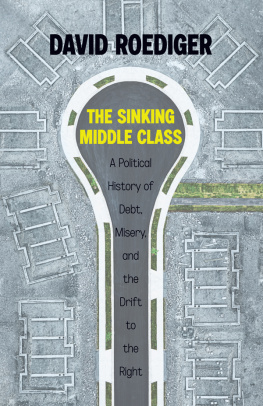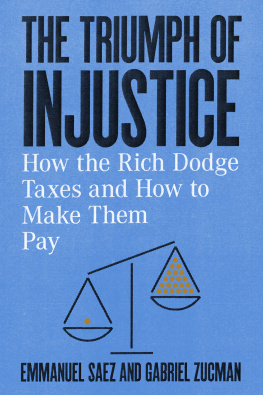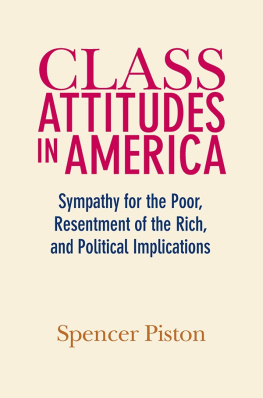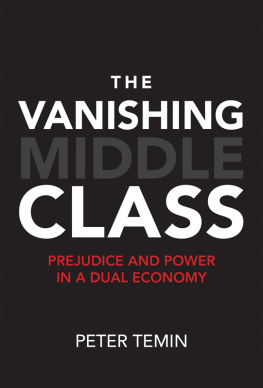
Copyright 2012 by Sam Pizzigati
A Seven Stories Press First Edition
All rights reserved. No part of this book may be reproduced, stored in a retrieval system, or transmitted in any form or by any means, including mechanical, electronic, photocopying, recording, or otherwise, without the prior written permission of the publisher.
Seven Stories Press
140 Watts Street
New York, NY 10013
www.sevenstories.com
College professors may order examination copies of Seven Stories Press titles for a free six-month trial period. To order, visit http://www.sevenstories.com/textbook or send a fax on school letterhead to (212) 226-1411.
Book design by Elizabeth DeLong
Library of Congress Cataloging-in-Publication Data
Pizzigati, Sam.
The rich dont always win : the forgotten triumph over plutocracy that created the American middle class, 1900/1970 / Sam Pizzigati. -- 1st ed.
p. cm.
Includes bibliographical references and index.
ISBN 978-1-60980-434-3 (pbk.)
1. Wealth--United States--History--20th century. 2. Middle class--United States--History--20th century. 3. Equality--United States--History--20th century. 4. United States--Economic conditions--20th century. 5. United States--Social conditions--20th century.
I. Title.
HC110.W4P59 2012
305.5509730904--dc23
2012037428
Printed in the United States
9 8 7 6 5 4 3 2 1
For Pablo Saul and Bianca Xitlaly
PREFACE
We Americans today consume most of our history from pop culture, from television and moviesand even ceremonies at Major League ballparks. Our popular culture teaches and preaches that the United States vanquished three terrible dangers back in the twentieth century: We beat Hitler and the Nazis. We beat the Russians and the commies. And we beat racial bigotry, thanks to heroes like Jackie Robinson.
But one vanquished threat to our twentieth century domestic tranquility gets precious little play in our popular culture, virtually no mention whatsoever: Over the first half of the twentieth century, we beat back plutocracy, rule by the rich.
I grew up in the 1950s on Long Island, right in the middle of the new America this victory over plutocracy created. My classmates and I took Americas new middle class for granted. And why not? We hadnt struggled to create a society where average families enjoyed security and comfort. We didnt knowor appreciatehow long and difficult that struggle had been.
In my case, that appreciation would finally come in the early 1970s when I started working as a labor journalist. I encountered in that work all sorts of old-timers. I still remember many of them. Len De Caux had turned seventy by the time I met him. He had immigrated to the United States as a young man in 1921 and had himself become a labor journalist. He covered union campaigns through the labor movements darkest days and then, in the late 1930s, edited the union paper that chronicled labors greatest upsurge. De Caux knew many of the political celebrities of those turbulent times. But he helped me understand that I owed my comfortable world to the struggles and sacrifices of average Americans.
As did Pat Tobin, a veteran activist who was representing the West Coast longshoremens union in Washington, DC, when I first met him. Tobin had been a poor Irish kid in 1934 San Francisco when a dockworker walkout turned into a citywide general strike. He never forgot those heady days. I kept in touch with Tobin after he retired at the start of the Reagan era. I loved listening to his stories, even the second and third time around. They gave me a sense of a time when working Americans by the millions saw the nations awesomely affluent as more pathetic than powerful. Ive learned from those stories, and Ive tried to bring their sensibilities into these pages.
Ive also learned a great deal from historians of my own generation, scholars who grew up in the same era I did and have devoted their careers to keeping alive our forgotten past. Historians like Joshua Freeman and Alan Brinkley take us back to a not-so-distant time when ordinary Americans felt ever so deeply that if they just kept working and struggling together, they could change their lives for the better.
Ive done some digging on my own as well, into old newspapers and memoirs and boxed-up personal papers. I didnt go looking for blockbuster deep dark secrets. I searched instead for overlooked episodes from our past that might help explain the smashing triumph over plutocracy we today so desperately need to repeat. I found some.
I do believe my grandfather would have liked this book. He helped make this history. A poor immigrant teenager from Italy a little over a century ago, a chauffeur for the rich in the 1920s, a Socialist Party organizer against the rich in the 1930s, the proprietor of a gas station in the 1950smy grandfather saw it all. Unfortunately, I never knew enough back then to ask him about it. I should have.
We should always ask.
Sam Pizzigati
Kensington, Maryland
July 2012
INTRODUCTION
In 1952, one of Americas most beloved social historians set out to write the story of the tumultuous first half of the twentieth century. Frederick Lewis Allen, the influential editor of Harpers magazine, would call his book The Big Change. Allen wanted to describe the awesome transformation that he personallyand Americans collectivelyhad witnessed since 1900. He certainly had plenty to write about.
Back in 1900, Americans lived without airplanes and automobiles, without TV and radio, without high-rises and suburbs. No Americans laughed and cried with family and friends at local movie theaters when the twentieth century dawned, or stuffed clothes into washing machines. Hardly anyoneoutside the nations most southerly climeseven ate fresh fruit in the winter.
So what did Frederick Lewis Allen, amid all these colossal changes, end up citing as the twentieth centurys single most important change of all? Simply put: equality.
Of all the contrasts between American life in 1900 and half a century or more later, Allen wrote, perhaps the most significant is in the distance between rich and poor.
Over the centurys first half, the popular historian marveled, the mansions and estates of the rich and fashionable had become museums and hospitals and college campuses. The super rich, an overbearing presence in America circa 1900, had essentially disappeared.
All sorts of midcentury observers celebrated that disappearance. Stuart Chase, a MIT-trained engineer and a nationally respected social critic since the 1920s, began a 1968 memoir by noting that he had lived through an era of shattering change. How shattering?
I can remember as a small boy, wrote the then eighty-year-old Chase, the first electric light installed in my grandfathers house in New England, and the first automobile on the street outside, and I have recently watched on television a space capsule with men aboard coming down on target in the ocean.
Yet for Stuart Chase, as for Frederick Lewis Allen, the technological miracles of their new midcentury age paled against Americas remarkable economic transformation, the achievement of an economy of abundance, an affluent society, where for the first time in history poor people are in a minority.
The grand rich who had somehow managed to dodge the subdivisions, the New Yorker writer Kenneth Lamott observed in 1969, amount to archaic survivals from an earlier epoch, nothing more, not men of our own time and unquestionably not the men of the future.

